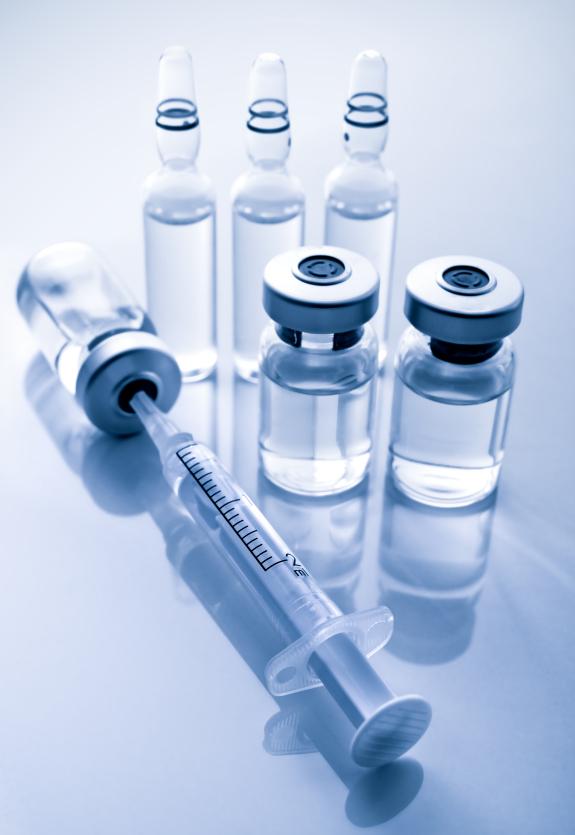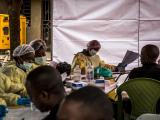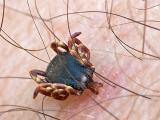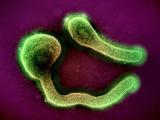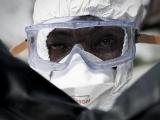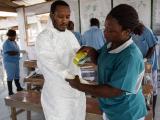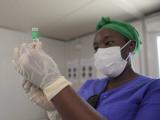Emergent BioSolutions announced yesterday that it has signed an agreement to produce an Ebola vaccine candidate that contains a booster in the form of a modified virus, with a phase 1 trial to launch soon in the United Kingdom.
Meanwhile, in news regarding health workers in the outbreak region, a Cuban medical team that was one of the first to volunteer announced that it is departing Liberia, and another worker potentially exposed to the virus in Sierra Leone arrived in Nebraska for monitoring.
Deal clears way for trial launch
In a press release, Emergent BioSolutions, based in Gaithersburg, Md., said the new vaccine is a version of the modified chimpanzee adenovirus (ChAd3) vaccine developed by GlaxoSmithKline (GSK) and the National Institute of Allergy and Infectious Diseases (NIAID) that contains its modified vaccinia Ankara (MVA) vector (MVA EBOZ).
Results from a ChAd3 trial recently published in the New England Journal of Medicine said an MVA vector might be an option to boost antibody levels and T-cell responses, Emergent said.
The company signed agreements with Oxford University, GSK, and NIAID and has manufactured the vaccine for use in phase 1 studies, which will be led by a team at the Jenner Institute in Oxford, England. It added that the trial, designed to test the safety of the vaccine, is supported by a grant from the Wellcome Trust and the UK Department for International Development.
Initial clinical lots of MVA EBOZ have been made at Emergent's Bayview facility in Baltimore and are undergoing release testing, the company said.
MVA EBOZ is made in an avian cell line, which removes the need for eggs in the manufacturing process, adds consistency to vaccine lots, and has the potential to increase the number of doses delivered, according to the company.
A phase 2/3 trial of unboosted ChAd3 vaccine and VSV-EBOV, which uses a vesicular stomatitis virus to deliver an Ebola gene segment, is under way in Liberia, and a ring vaccination trial of VSV-EBOV is set to launch soon in Guinea.
Two other Ebola vaccine trials are under way for candidates that use MVA, one involving ChAd3 with a booster vaccine from Bavarian Nordic called MVA-Filo, and a prime-boost regimen from Johnson & Johnson and Bavarian Nordic.
Vaccine experts have said different vaccines and different strategies may be needed to battle Ebola. Several questions still remain about which vaccine candidates will provide the best dose-sparing and production scale-up options, but researchers may have a tough time answering them, with declining infection levels in the outbreak countries making it difficult to conduct studies that produce meaningful results.
Cuban team departs Liberia
Cuban government officials yesterday announced that the Cuban medical team working in Liberia has completed its response mission. The announcement was made at a ceremony in Monrovia, the capital, to bid farewell to the team, according to a statement from the World Health Organization (WHO) Regional Office for Africa.
Cuba was one of the first countries to send a medical team to the outbreak region. Liberia has seen the steepest drop in cases among the three hardest-hit countries and has just gone 2 consecutive weeks without reporting a confirmed case.
Cuba's team was made up of 53 medical officers who received initial Ebola training in Cuba and a second round of training once they arrived in Liberia. The team worked as part of a WHO international contingent at an Ebola treatment center in Monrovia.
According to the WHO, the team managed 198 admissions, of which 54 involved confirmed cases, from Nov 6, 2014, thorough Feb 4. The team's last patient was discharged on Feb 10.
The WHO said no Cuban health workers at the Liberian treatment center contracted Ebola infections. However, a Cuban doctor was sickened by the virus while working in Sierra Leone and recovered from his illness.
Health worker exposures, outbreak numbers
Nebraska Medical Center said a fifth individual has arrived at the facility to be monitored for Ebola symptoms, according to a post on its Twitter stream. Those at the center include contacts of an American health worker who was recently sickened by Ebola while working in a Partners in Health (PIH) treatment unit in Sierra Leone. The individuals are thought to be among a group of 10 who were evacuated to the United States after possible exposure in Sierra Leone.
One of the five has been admitted to the facility's biocontainment unit. The individual started having symptoms on Mar 15, but hospital officials said they resolved by the next morning.
In a statement today, Paul Farmer, MD, cofounder and chief strategist for PIH, said the group is collaborating with the US Centers for Disease Control and Prevention (CDC), the WHO, and Sierra Leone's health ministry to investigate the protocols, policies, and procedures that led to the infection and potential exposures.
He said PIH's next step is to redouble its efforts in Sierra Leone and Liberia, while supporting efforts in Guinea. "That will require a great deal of humility," he said. "How might we have moved faster? How might we provide better clinical care so that our case fatality rates are lower? How might we do so more safely, so that there are no more occupational exposures, for either expatriates or national staff?"
In other developments, the WHO said today that the number of confirmed, probable, and suspected Ebola infections in the three outbreak countries has risen to 24,666, with the number of deaths climbing to 10,179.
The totals include data as of Mar 15 for all three countries. The numbers reflect an overall increase of 69 confirmed, probable, or suspected infections since the WHO's last update yesterday, along with 35 more deaths.
See also:
Mar 16 Emergent BioSolutions press release
Mar 16 WHO African regional office statement
Nebraska Medicine Twitter feed
Mar 17 PIH statement
Mar 17 WHO update
